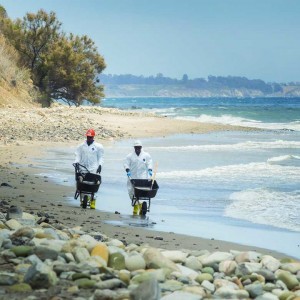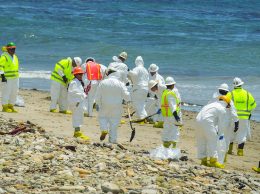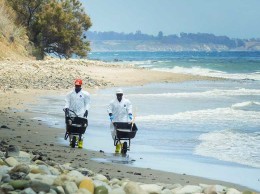Refugio oil spill shows companies haven’t learned lesson after 46 years
IN THIS ARTICLE
- Columns Topic
- Guest commentary Author
By Guest commentary Friday, July 17th, 2015
Why does our collective memory seem so short? The gorgeous coast where we live and work was despoiled by a massive oil spill 46 years ago and we vowed never to let it happen again. That was in 1969, when a Union Oil Co. platform six miles off the Santa Barbara County coast suffered a blowout that spewed millions of gallons of crude oil over 800 square miles of ocean. The tar blackened 35 miles of coastline and beaches, and killed birds, dolphins, seals, sea lions and otters.
With a country in turmoil from the Vietnam War, assassinations and riots, the environment took center stage. As the city attorney for the city of Santa Barbara, my office pursued the oil company and obtained millions of dollars in damage payments. But more importantly, injunctions were obtained and legislation was passed that stopped the building of over 70 similar platform rigs in the Santa Barbara Channel. Imagine 70 more potential disasters. Earth Day came about because of the spill. The Environmental Protection Act, the Clean Water Act, the Clean Air Act and other key environmental laws were enacted across the country.
And then, years passed and we started to forget about the danger that oil drilling represents to our safety and to our environment. Sure, a tanker crashed in Alaska, and yes, the BP disaster killed 11 workers and will impact the Gulf for decades to come. But here, no. We forgot it could happen again here.
Another oil operator out of the Houston, Texas oil patch, Plains All American Pipeline, ran a shoddy, sloppy, even grossly negligent pipeline through the beautiful Gaviota coast. Since the pipe was buried, the operation took on a “see no evil” enterprise. On May 19, Plains’ 24-inch pipeline that runs for 10 miles just above the shoreline burst. It took hours for the company to shut off the oil flow, but by then over 100,000 gallons of crude oil spilled out into a culvert, and thousands of gallons flowed into the sea.
The pipeline lacked an automatic shut-off system that would have prevented such a large oil spill from occurring. When the pipeline was built in 1987, Santa Barbara County demanded that a shut-off system be installed and that the county inspect the welds on the pipeline. Plains sued and convinced a federal judge that the county lacked the authority to force it to install an automatic shut-off system or inspect its pipeline.
The government wasn’t minding the store. Plains, left to self-monitor its safety operations, was pumping thousands of gallons of crude oil without automatic shutoff valves through a pipeline that was as thin as 1/16 of an inch in many places; thinner than a dime. Without the proper safeguards, it doesn’t take much for a rupture to occur.
When I was a young government lawyer, I campaigned to push the lawsuit against the oil companies, in part, to prevent such a disaster from happening again. Today, I have the same determination to ensure the oil industry and the public remember the inherent risk of oil operations and the need for stringent government oversight. Leaving safety up to the oil industry is a sick environmental joke.
We need to become, once again, as vigilant as we were 46 years ago so our environment is protected from those who put profits ahead of protection.
That’s why, when a concerned homeowner came to our law office with her account of the damage from the spill, I knew we had to act. She now will represent numerous property owners who live along the coast and who will suffer long-term effects from the spill.
We demand that oil pipelines never again operate without being completely safe from similar incidents, and that governmental agencies have the authority to monitor oil company pumping activities and take punitive steps when these companies try to take safety shortcuts.
It would have been better for the environment and less costly if Plains did the right thing back in 1987 and put in an automatic shut-off system. Now, the company will spend over $100 million to fully clean up the spill and millions more in damage payments.
Let this be a lesson that we, and the oil companies, don’t ever forget.
A. Barry Cappello is managing partner in the Santa Barbara law firm of Cappello & Noël LLP.













